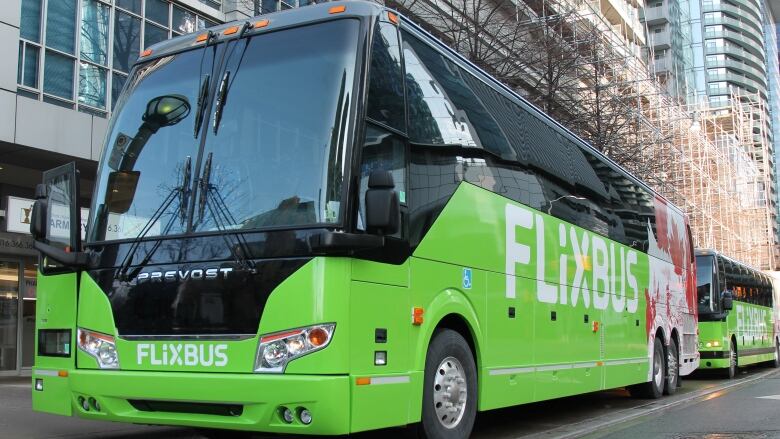FlixBus to start Alberta bus routes connecting Edmonton, Calgary and Lethbridge
New intercity bus service starts Friday, with company planning further expansion

New bus routes between Alberta cities will start running this week as German transportation company FlixBuscontinues its Canadian expansion.
The German company announced in a statement that their intercity service begins Friday,with four daily trips between Edmonton and Calgary,and two daily trips between Calgary andLethbridge.
FlixBus, which also operates in the U.S. and dozens of countries acrossEurope, rolled out bus routes in Ontario in 2022,then moved into Quebec and B.C.
The new player on Alberta highwaysarrives after Greyhound ended virtually all service in western Canada in 2018, then pulled out of Canada entirely in 2021.
Divine-Faith Johnson, government affairs and strategic partnerships associate with Flixbus,told CBC News on Wednesday that the company is planning further growth.
"Just for the launch, we did focus on the major [cities], but we are definitely looking to expand to neighbouring towns as well," she said.
Johnson said she couldn't give specifics about which communities might get new bus service, but the intention is to do it soon.
The company's model is to partner with local bus companies that own the coaches and hire drivers, while FlixBusdeals with network and route planning, plus the ticket platform, pricing and marketing. The description on the company website calls it a"combination of a tech start-up, an e-commerce company, and a classic transport operator."
In Alberta, FlixBusis working with charter bus company Universal.The current routes also include stops in Red Deer, Okotoks, Fort Macleodand Claresholm.
Companies try to close gap left by Greyhound
The province hasn't been completely without intercity bus service since Greyhound's departure. Pacific Western Transportation still runs Red Arrow bus routes connecting Lethbridge, Calgary, Red Deer and Edmonton.
Sunny Balwaria is president of Edmonton-based bus serviceCold Shot,a company that used to partner with Greyhound, andtook over some of the rural routes Greyhound left in 2018.
He's been advocating for the provincial government to step in with funding to help support operations, especially for bus service in northern Alberta between communities without any other options.
Another bus operator that used to have scheduled service in the north ended routes between High Level, Edmonton and Grande Prairie after the pandemic began.
"Every company in our industrystruggled big time in COVID. Finally, we were hoping this year is going to be a catchup to the losses," Balwaria said.
But he said that's going to be difficult with higher gas prices after this week'sreturn of the provincial fuel tax and increase to the federal carbon tax plus new competition.
FlixBus is advertising one-way trips between Edmonton and Calgary for about $5 to $25. Johnson said some of that is promotional pricing for the company's Alberta launch, and at other times, prices will vary.
WATCH | Greyhound ends service across Canada in 2021:
Balwaria said he worries companies like his can't possibly compete, and won't be able tomaintain operations in rural areas that need theservice,beyond the busiest corridorof theQEII highway.
"Our main challenge is to keep a comparable ticket price, so the competition is still there in the market, and keep running the system," he said.
"Unless government will come in the middle, I don't thinkit's going to be a long-lasting industry ... andthen at that point, I guess the provincial or federal government is going to step in: 'Do we need this service for these people or these towns, or we don't?'"
Devin Dreeshen, Alberta's minister of transportation and economic corridors, has not yetresponded to a request forcomment from CBC News.













_(720p).jpg)


 OFFICIAL HD MUSIC VIDEO.jpg)
.jpg)



























































































